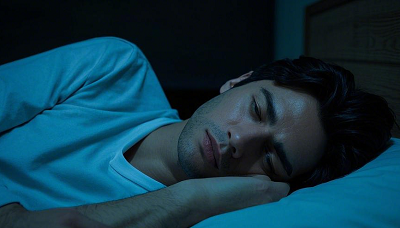Can Prostatitis Cause Insomnia? Good Sleep Quality Helps Recovery
Many people experience insomnia nowadays. Occasional sleepless nights are not a big deal, but chronic insomnia over time can significantly affect one’s work and daily life. Many prostatitis patients find that their sleep quality is poor, making it difficult to fall asleep and increasing anxiety. Is this due to prostatitis? Let's take a closer look!

Can Prostatitis Cause Insomnia?
Generally speaking, prostatitis itself does not directly cause insomnia. However, many prostatitis patients, especially those with chronic conditions, are more likely to suffer from insomnia. This is mainly due to the following reasons:
1. Pain and discomfort caused by prostatitis can make it hard for patients to relax, causing tossing and turning and difficulty falling asleep.
2. Prostatitis patients often experience frequent urination, urgency, and nocturia (frequent night urination). While sleeping, all organs enter a state of rest, but frequent urges to urinate stimulate the brain, which disrupts sleep. Waking up frequently during the night to urinate can also decrease sleep quality.
3. Prostatitis affects male sexual function, leading to increased psychological pressure, mental stress, and anxiety. This can significantly reduce sleep quality.
Good Sleep Quality Is Crucial for Recovery!
It’s well-known that good sleep quality has many benefits for the body. Let’s break down the benefits in more detail:
1. Relaxation of the body:
Deep sleep allows the body to fully relax, relieving fatigue and muscle pain accumulated during the day. This makes good sleep quality essential for physical relaxation.
2. Regulating hormone levels:
Adequate sleep helps the brain and nerves fully rest, ensuring proper organ function and more stable hormone levels, which in turn boosts the immune system.
3. Promoting recovery:
Good sleep enhances metabolism and facilitates the removal of toxins from the body, aiding in the recovery of health.
For prostatitis patients, maintaining a regular sleep schedule (early to bed, early to rise) and ensuring good sleep quality is helpful for recovery. Sufficient and good-quality sleep promotes blood circulation in the prostate area, reduces inflammation, and accelerates recovery.
What Else Should Prostatitis Patients Pay Attention to During Recovery?
In addition to maintaining good sleep quality, patients also need active treatment. Continuing to take Diuretic and Anti-inflammatory Pill can help clear heat, detoxify, kill bacteria, and relieve urinary issues and pain, which helps the prostate return to normal. However, treatment is just one part of the recovery process. Many daily habits and lifestyle choices also play a vital role in prostatitis recovery.
First, adjusting urination habits is crucial. If you feel the urge to urinate, always go to the bathroom promptly. Many cases of prostatitis are caused by holding urine. Holding urine can overstretch the bladder, compress the prostate, and block the prostate ducts, preventing inflammatory substances from being expelled, which aggravates the inflammation. Over time, this can lead to urine reflux, carrying bacteria into the prostate and causing infection. Therefore, no matter how busy your work is, it’s important to develop the habit of urinating in time and not neglect it, as this can hinder recovery.
When it comes to diet, patients should be especially careful. Avoid spicy, stimulating, and greasy foods. The diet should be light, nutritious, and easy to digest. Spicy foods like chili, Sichuan pepper, and ginger can irritate the prostate and urethra, causing blood vessels to expand and worsen prostate swelling and pain. Greasy foods can cause internal damp-heat, affecting the prostate's metabolism.
Patients should focus on eating foods rich in vitamins, minerals, and dietary fiber, such as fresh vegetables (broccoli, carrots, spinach, etc.), fruits (apples, bananas, oranges, etc.), and high-quality protein sources like lean meats, fish, and beans. These foods can help boost the immune system and promote the reduction of inflammation.
Developing good living habits is also essential. Balance work and rest, get enough sleep, and avoid staying up late. Staying up late disrupts the body’s biological clock, leading to endocrine disorders that weaken the immune system and make the prostate more susceptible to bacterial and viral infections. Overworking also puts stress on the body, exacerbating the burden on the prostate.
Patients should plan their work and rest schedules reasonably, ensuring they get adequate sleep each day. For example, try to go to bed by 11 p.m. and aim for 7–8 hours of quality sleep. Additionally, relaxing activities such as listening to music, reading, or taking walks can help relieve stress and keep the mind and body happy.
Moderate exercise is also important for preventing prostatitis recurrence and promoting recovery. Exercise improves blood circulation throughout the body, including the prostate area, which helps absorb and dissipate inflammatory substances. It also enhances the immune system, improving the body's ability to resist infections and preventing other conditions from worsening.
Patients can choose exercise forms that suit them, such as jogging, swimming, yoga, or cycling. However, exercise intensity should be moderate to avoid injuries. For example, when jogging, maintain a moderate speed and exercise for about 30 minutes each time, 3–5 times a week.
Regular check-ups are also an important part of prostatitis recovery. Through follow-up visits, doctors can monitor the progress of the disease and adjust the treatment plan if necessary. Patients should follow the doctor's advice and regularly check their prostate fluid, urine routine, and ultrasound to track their recovery. If any discomfort occurs during recovery, such as worsening urinary frequency, urgency, or pain, or if symptoms like fever or increased perineal pain appear, seek medical attention immediately to prevent delays in treatment.
That's all for the discussion on whether prostatitis causes insomnia. I hope prostatitis patients can enjoy good sleep quality and recover their health as soon as possible!
You may also be interested in:
Sleep is Important for People with Chronic Prostatitis! Remember Not to Get Too Tired
Sleeping on Your Stomach: Does It Cause Prostatitis?
Sedentary Work and Prostate Health: How to Improve Sleep Quality and Protect Your Prostate



